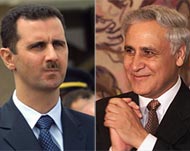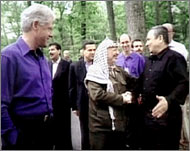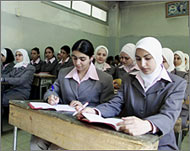Clinton urges Syria-Israel peace talks
Former US President Bill Clinton says Syrian President Bashar al-Asad is in a good position to move forward with Israel in peace following Israel’s call for the Syrian leader to visit Jerusalem for peace talks.

Speaking in Qatar’s capital Doha to Aljazeera.net, Clinton said on Monday that he had hoped the late Syrian leader Hafez al-Asad could have signed a peace deal with Israel during the 2000 Shepherdstown talks, during which Clinton was president.
He said both sides would have had to have made difficult compromises.
Clinton described Israeli President Moshe Katsav’s Monday call for al-Asad to visit Jerusalem for peace talks as “wonderful”, adding al-Asad would be aware that moving forward in the Syrian-Israeli peace track would facilitate a resolution to the Palestinian-Israeli conflict.
Change policies
The former US President said a peace deal between Israel and its arch-foe Syria may also change policies in Israel in finding a resolution to its decades-old conflict with the Palestinians.
Clinton was speaking in Doha where he addressed the closing ceremony of the second annual US-Islamic world forum, the aim of which is to promote understanding between Washington and the Islamic world.
The three day event has been co-sponsored by the government of Qatar and the US-based Brookings Institution’s Saban Centre for Middle East Policy.
 |
|
‘Al-Asad (L) is well placed to |
And in Egypt, US Middle East envoy William Burns called for any opportunities that would revive the Israeli negotiations with Syria and Lebanon to be seized.
But Syria’s UN Ambassador Faisal Makdad poured more cold water on the Israeli invitation, saying Israel must first get serious about wanting peace.
Makdad was quoted by AFP as saying the invite had no impact unless Israel paid “serious respect” to UN Security Council resolutions.
Earlier, Clinton called on Arab states to play a more active role in resolving the Palestinian-Israeli conflict, saying the United States could not broker the peace process alone.
He urged the Arab world not to judge Washington through the context of the Middle East peace process, adding any failures in the negotiations were not due to anti-Muslim feelings.
Clinton efforts
During his two terms as president from 1992 until 2000, Clinton was deeply involved in brokering an end to the Palestinian-Israeli peace process.
 |
|
Clinton (L) with Arafat (C) and |
As his second term drew to an end, Clinton tried to secure his place in history as the leader who brokered an end to the decades-old conflict by holding trilateral talks with Palestinian President Yasir Arafat and former Israeli Prime Minister Ehud Barak at Camp David in July 2000.
The talks broke down after the sides failed to agree on some of the most contentious issues, including borders, the right of return for Palestinian refugees and the fate of occupied Arab East Jerusalem. Two months later the Intifada against Israel’s continued occupation erupted.
Clinton said the Geneva Accord, an alternative peace deal launched by Palestinian and Israeli politicians in October 2003, was proof that the two sides could sit down and make concessions in an effort to broker peace.
|
Clinton said the Geneva Accord, an alternative peace deal launched by Palestinian and Israeli politicians in October 2003, was proof that the two sides could sit down and make concessions in an effort to broker peace. |
He also defended Washington’s staunch support for Israel, saying it was not rooted in hostility towards the Palestinians. The Holocaust, presence of Jews in the United States, and the United Nations resolution supporting the creation of Israel were all factors contributing to US support, said Clinton.
He slammed Arab nations for what he said was abusing Palestinians, saying they “provided for a convenient football”. Clinton urged Arab states to help Palestinians receive better education, find jobs, settle refugees and reach out to Israel.
US perceptions
“Too many Americans know too little about the Islamic world,” said Clinton, adding much of their views were formed after the September 11, 2001 attacks in New York and Washington.
“The West tends to see Islam through a spectre of terror,” he said. He praised US President George Bush’s visit to a Washington mosque days after the attacks, saying it was aimed at demonstrating to Americans that any hostilities were against “terror” and not Islam.
However, Clinton admitted that sometimes this was forgotten.
The former US President said that ties between Washington and the Islamic world were “not all that good.” He stressed the need for dialogue to bridge the differences, saying talks between the sides would lead to greater understanding.
Education changes
The former US leader joined other forum participants in calls for reforming education systems in the I
 |
|
GCC states are to revise school |
Islamic and Arab world, saying the readings of religious texts should be “highly-selective”. Clinton said religious schools need to teach science and arts rather than hatred.
In recent weeks, member states of the Gulf Cooperation Council (GCC), Saudi Arabia and Jordan have all announced they will revise text books to promote tolerance.
Following the September 11 attacks, Washington has demanded text book revisions, claiming the current books promote hatred.